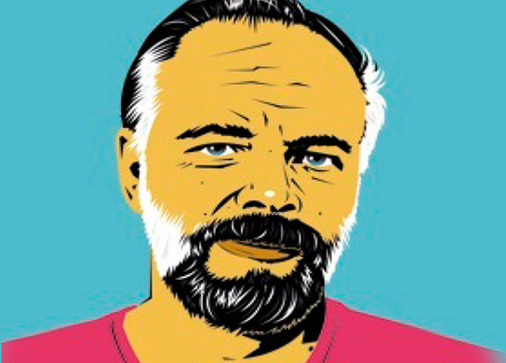
Image by Pete Wesch, via Wikimedia Commons
Philip K. Dick died in 1982. His distinctive, some say visionary brand of psychological sci-fi literature, however, has lived on, proving its endurance in part by taking new forms. Blade Runner, Ridley Scott’s hugely influential adaptation of Dick’s Do Androids Dream of Electric Sheep?, premiered just three months after the author’s departure. More films followed over the years, including Paul Verhoeven’s Total Recall (an adaptation of “We Can Remember It for You Wholesale”), Steven Spielberg’s Minority Report, Richard Linklater’s A Scanner Darkly, and many others.
Dick’s work has also provided the basis for radio dramas, television shows (most recently Netflix’s The Man in the High Castle, with an ambitious anthology series coming to Channel 4 this spring), and stage productions.
Typically, these adaptations use the stories and novels in which Dick wrote the setting, plot, and characters with relative straightforwardness. Other, later works found him plunging as deep into philosophy and autobiography as into science fiction. The change happened around the time he saw a mysterious pink light and met God in 1974, or claimed to, and it produced a final set of novels known as the VALIS trilogy.
The fractured tale of an authorial alter-ego named Horselover Fat, VALIS (short for “Vast Active Living Intelligence System”), the first book in the trilogy, involves an alien space probe, Watergate, the Messiah, lasers, and a range of references to religions like Christianity, Gnosticism, Buddhism, Gnosticism, Zoroastrianism, and the Red Cross Brotherhood; philosophy from the ancient Greeks to Plato, Pascal, and Schopenhauer; and cultural figures like Handel, Wagner, Goethe, and Frank Zappa. It would take an ambitious mind indeed to adapt such a thing: specifically, it took the mind of Tod Machover, composer and director of MIT’s Media Lab, who turned it into an opera in 1987.
“We live in a world that is becoming in fact more and more fragmented, more and more complex,” says Machover on the relevance of VALIS at an interview at the Philip K. Dick Fan Site. “You don’t have to have a pink light experience to realize that there is too much information to not only be aware of but to make any kind of sense out of.” He describes this “incredible feeling of the world being not only too complex for any one person to make sense out of but also dangerously complex, to the point where people will not only not understand each other but end up hating each other and being absolutely crushed under the burden of just trying to make sense with how much there is to know.”
In his VALIS opera, which premiered at Paris’ Centre Georges Pompidou with installations created by video artist Catherine Ikam, Machover tried to get that feeling artistically across, and you can hear it free on Spotify. (If you don’t have Spotify’s software, you can download it here. There’s a Youtube version right above.) Back then in the 80s, he says, it “seemed like through our media and communications there’d be a kind of facile way of connecting people, a sort of passivity and turning on your cable TV and seeing what’s going on today in Tokyo or in Europe and you sort of feel like you can take all this stuff in. But in fact I think what we’re seeing now is exactly what Dick predicted, which is that it ain’t that easy.” And it sure hasn’t got any easier.
Related Content:
Philip K. Dick Takes You Inside His Life-Changing Mystical Experience
Hear 6 Classic Philip K. Dick Stories Adapted as Vintage Radio Plays
33 Sci-Fi Stories by Philip K. Dick as Free Audio Books & Free eBooks
Based in Seoul, Colin Marshall writes and broadcasts on cities and culture. He’s at work on a book about Los Angeles, A Los Angeles Primer, the video series The City in Cinema, the crowdfunded journalism project Where Is the City of the Future?, and the Los Angeles Review of Books’ Korea Blog. Follow him on Twitter at @colinmarshall or on Facebook.


The Man in The High Castle is an Amazon exclusive. It will likely never air on Netflix.